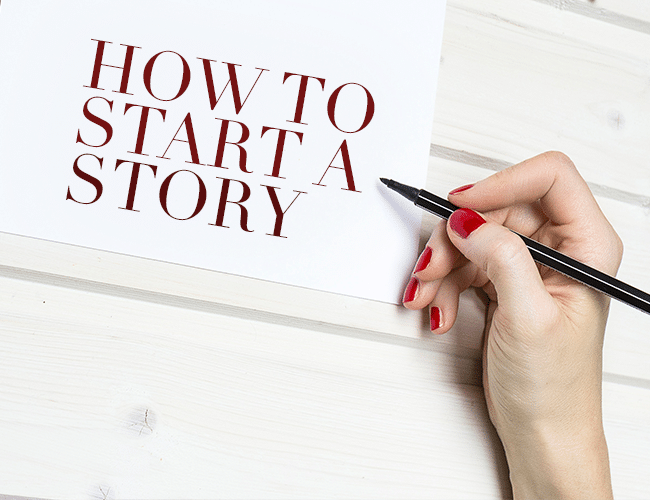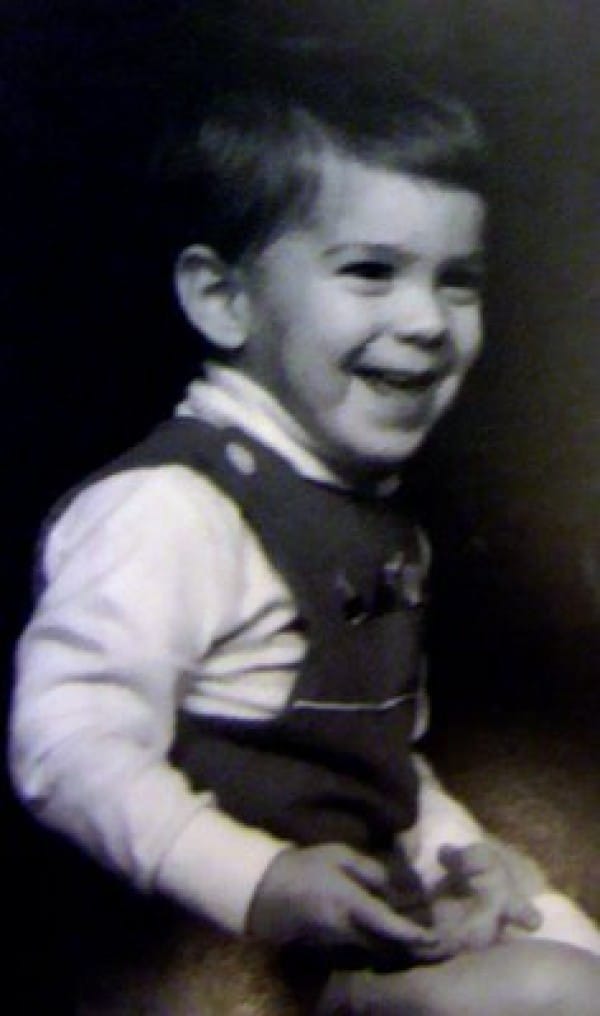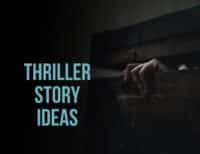This is a question I hear a lot: How do I start my story? The answer is simple, but not easy. Got your diving mask on? Ready to figure out how to start a story? Here we go!

The short answer:
How To Start a Story
If you're stuck wondering where to start a story, just remember this: a story starts where “normal” ends. So where does normal end in your story?
Of course, there's more to it than that. If you want the full answer, read on:
Why It's Hard to Start a Story
The main problem here is that when we think of stories starting, we think of finished books, completed movies, stories that have been edited and polished and buffed until they grab you from word one and don't let go until the final page.
Your brand-new story is not going to look like that.
We all face the Creative Gap, something I talk about often, and probably will until I die. We know what good stories are like, but our beginning stories are never that good because it takes time and effort to create well. That journey can be discouraging.
The creative gap is hard to cross, fellow writer. Darn those good tastes that got us into writing in the first place.
How to Start a Story
Your story starts where “normal” ends.
To put it another way, the pattern of your character's life is “normal.” A dragon-rider, a robot-mechanic on Mars, a pirate, whatever their deal is, the pattern of their life is their normal. When that pattern breaks is when your story begins.
The whole point of a story is it goes somewhere. There's forward motion. Things at the end are not the same as things at the beginning. Your character faces something and either overcomes it or doesn't, and the transformation of maturity / character / understanding / status / location / etc. is the story your reader empathizes with enough to follow.
The journey IS the story.
So when does the pattern break? Here are some examples.
SLEEPING BEAUTY: Lovely day, lovely baby, OOPS here comes the evil fairy to curse the child and break the expected baby-day pattern.
IT (the book by Stephen King): Ordinary 1950s small town, unpopular kids making friends, OOPS here comes an intergalactic monster who dresses like a clown and ruins this otherwise normal childhood.
HARRY POTTER: Abused orphan living under the stairs, attending school, surviving bullies, minding his own business, when OOPS he talked to a snake and now he's attending magic school!
THE BOOK THIEF: Just Death here, going about his ordinary day, when OOPS this little girl in World War II didn't die but should have, prompting him to follow her the rest of her life.
When normal breaks, your story begins.
This is true for memoirs, too. They often follow this kind of pattern: Here I am, an ordinary child, when my father suddenly dies and changes the entire trajectory of my life.
Yes, there's variation. Yes, there are flashbacks and teeny intros (like Dumbledore leaving baby Harry with the Dursleys). However, those aren't where the story starts. Those are backdrop; set pieces; trees and wallpaper and bridges and roads, and they all exist to get your story where it's going.
Once you know where your story starts, you can worry about little teeny intros later. Getting it started comes first.
Where NOT to Start Your Story
In a way, you already know this answer because you've experienced it.
Ever started a book that began with a character's day but went on with the normal of that day a little too long, leaving you uninterested?
Usually, that's because the book is covering things you don't care about. Nine times out of ten, those things are skippable because you already know them.
That means the story began a few pages after where that author chose to start. Once you understand what a character's normal is, you rarely want to read it.
As readers, we don't need normal. That's not how to start a story.
We need to see normal break.
Where Will You Start Your Story?
First off: don't panic. You're allowed to get this wrong.
As long as you write the thing, you can always fix the opening.
Pantsers: For now, write the scenes that are in your head. Write what you know — even if it's the very end of the story. You can rearrange those scenes AFTER the book is finished.
Plotters: Write the first scenes in your outline. You can decide AFTER the book is finished if that's where you really ought to start.
Second of all: don't panic. I know I said that already, but it's easy to miss.
Writing can be scary. We want our books to be as glorious as the ones we've read, and they can be — they just don't start out that way. Books are like Olympic sports. See this showboat?

All those medals! Wow, right? Well, he started out like this:

That kid is very cute, but he is not winning any gold medals.
He had to grow up and walk and run and trip and fall and splash in the kiddie pool and learn to hold his breath and practice for years.
Your book is an Olympic sport. You're learning to write it. Give yourself time and patience. You'll get the right opening. Just write story first; then you can tweak it. Patience, Padawan!
Do you have any tips for how to start a story? Let us know in the comments.
PRACTICE
Take fifteen minutes to write about the moment in your story when normal breaks. When you're done, leave your beginning in the comments, and don't forget to reply to three other story starters, too!







Critique partner said my first or second sentence, which I have moved around, is “too on the nose.” I thought you should begin with a hook. “The year my Nana came to live with us changed my life.”
What do you think??
Hi, Beth! That hook is exactly what I was talking about. The year Nana came = the thing that changed “normal.” 🙂
I like this. A good hook indeed. Short and tells you already that her Nana’s move shook the complacency of her world. Great work. Good luck with that.
My story will be in spanish but it will begin something like:
The sounds of footsteps in the attic and of things being moved around woke Marcelo up. As he got there he das his dad sitting in a corner of the attic looking at something on his hands, he somehow looked older. The boxes the men brought yesterday were all opened, some things were scattered on the floor…
Ooh, something interesting is happening here!
I wrote a story for class and when it was edited by my peers, one said there were a few things missed but she LOVED the cliffhanger I left her with. In all honesty she was left with the cliffhanger due to word limitations… But why focus on the negative other than to change it. Keep the eye on the good stuff and you will keep moving.
“Keep moving” is definitely the way to go! But how did you START it? 🙂
She awoke to a beautiful day. The sun warm the breeze cool…..
Lovely! Now, that’s the opening – but where does the change come in? Where does “normal” break?
when she visits a new hair dresser and she cuts more than she was supposed to, that’s where I think the “fun” starts.
There you go! I knew you had it! 😀
My story starts with what seems to be a nice evening, fireplace lit, eating chestnuts, you know good stuff. The main character is currently freezing and starving to death and dreams about the past and the people around him.
Wolf barges into the hut, they fight, hero survives the winter and from that moment on the whole world begins spiraling into an ever larger conflict.
It was meant to be the first pebble that begins a landslide… not sure on how it works though.
I love the idea! How does the wolf tie into the bigger events?
The wolf is the first spirit Erik ties to his own after it dies, changing him and the way he interacts with the world also allowing him to change form…
It will stay with him through the entire first book at least.
This is a great idea. I know I’d want to read more. Write on!
Thank you, Ruthanne for a wonderful tip which will make the beginning of my story more interesting for a reader.
I’m so glad it helped, Danka!
Excellent post, Ruthanne! Here’s a bit of my WIP:
The barking of the bloodhounds heralded their nearness. Ayotunde fell to the ground exhausted. He knew he needed to cross the river, but the ominous darkness of the forest disoriented him. He’d escaped from the plantation that night when everyone was asleep—except the dogs. Their howling barks had alerted the plantation owner and his men, which resulted in the search party now hot on his trail. The thought of freedom energized him to continue and upon pondering this, he prayed to the orishas—the religious deities of his people.
Daylight was fast approaching, and Ayotunde panicked. He couldn’t think with a clear head. As he clutched a burlap sack to his chest carrying the symbols of the orishas, he invoked their help. The distant sound of horses’ hooves propelled him to dart sideways into the forest running parallel to the riverbank. The sweat clouded his eyes blocking his line of vision. Rubbing his face with the back of his hand, he failed to notice the thick root jutting from the ground where his foot caught. He fell and heard a crack. A guttural howl emanated from his throat as he grabbed his left leg before he passed out.
Oh Claire. What a riveting opening. This is loaded. Poor guy. That fainting and that broken(?) foot came at the wrong time. Where is his God right now? I certainly want to read more. Where can I find you? Great job.
Thanks a bunch for your feedback, Selma. I started this story recently and have not been able to continue. I don’t have any website where you can find me, but you can always reach me through email at cmmachado@me.com
So you’re NOT part of The WritePractice Community of Writers yet? Oh girl, you’re missing out on your calling. You already have your Writers cap on right. Now You need practice, guidance and accountability! That’s what you need to continue. Id love to see you inside.
I recently wrote a piece on practice guidance and accountability. No pressure, but if you’re so inclined please read me here:
My blog
https://intricaciesandfollies.com/2017/09/24/100-day-book-challenge/
My humble take on this.
See you inside? Hope so. Selma.
Hi Selma. I’ve been contributing to The Write Practice since 2013. I usually just post when the topic strikes me as interesting and, most of the time, when I have the time. Lately, I’ve had to forgo writing to take care of other things. Anyway, thanks for providing the address to your blog. i’ll check it out. Thanks again.
Great story Beginning! Can’t wait to hear the rest! Don’t think the plantation owners would have allowed him to keep any items from his culture, though! Great story to keep anyones interest to the end!
Thanks for having given my excerpt a read, Beverly. I appreciate your comment.
Yow, what an opening! Definitely a moment of “normal” breaking. You’ve caught attention!
My only concern is him passing out right away. That’s kind of like jet engines getting a race car going SUPER FAST at once – and then hitting a wall. 🙂 Could he stay conscious for what happens next?
(Also, as someone who recently broke an ankle, there was no passing out for me! Ow ow ow!)
Thanks for your comment, Ruthanne. It means a lot. In reality this is an abridged version of the beginning of the story. I included the first paragraph and merged some of the prose from the next to the last and the last paragraph. There’s some information in between that wasn’t included that makes you understand the reason he passed out. It was more from the impact of what had happened to the symbols of his gods that from the broken ankle. The beginning of this story ends with that last sentence in my previous post. The rest of the story takes place in the present time where the protagonist, a direct descendant of Ayotunde, will be influenced in one way or another by the warrior orishas that were introduced at the beginning of the story. I still have to work on that plot and how the story will end.
That makes a lot of sense, Claire!
I think I could sit up all night and read this book!
The opening lines of my debut romance novel (on second draft): Nothing was different, but everything had changed. Her surroundings, her interests–the habits of her life, all familiar. The present exception being now, she was a five-foot and four-inch combination of bold confidence and crippling fear.
Oooh, intriguing! But what changed?
The Pinellas County Sheriff’s Department was swamped. Deputies Kim Brown and Rick McNeal were on their way to the burbs. Siren blaring. Backup would come, but it’d be delayed. McNeal and Brown would be dealing with an armed drunk who’d shot his teenage son.
Wow, that’s intense! Thanks for sharing it!
My only question is: how is this different from normal? Since they’re police, this might just be their normal day. How does “normal” break for them?
Thanks for he comments. Their daily job can be dangerous at times, but heading, without backup, into a situation in which a gun wielding inebriated man who shot his own son is ready to put up a fight with police in the middle of the day is not normal. It may no be an unexpected thing, but it isn’t the norm. Writing tickets for running red lights or speeding or answering calls for auto accidents is a normal day.
jkjhbkjhbkh
[image: Dennis Fleming on about.me]
Dennis Fleming
about.me/dennispfleming
My! My! My! Can’t hold out much hope for him, but Great story beginning!
I take this Padawan (apprenticeship) Title very serious. That has been me all my life. This article, with its kick-ass title lured me in here. Makes sense. Makes sooo much sense— all of it. But I have miles to go before I sleep, I have miles to go… and I want to cry. Thanks for sharing it.
Here is what I have:
Dawn ushered in another day. Morning in Kokoro glistened under the rising sun, a slight mist still lingering in places along the shore. The quiet excitement of the silhouetted figures moving near the wharf matched the quiet dawn. Fishermen loaded their nets, coolers and their thermoses then disappeared inside their boats, readying them to head into the bay.
The gentle lapping of the waves made her realize that she needed to go to the bathroom in an urgent way. But her 6:30 alarm hadn’t gone off yet — she determined to wait until it went off to get out of bed.
A gentle breeze caressed the back of her ears causing her to stir.
The night before she had tied her scarf over her eyes to shade them from bright lights. That morning the scarf covered her entire face. She remained still to acclimate herself back to her senses.
The heaviness in her head, the taste of bile in her mouth and the stiffness over her entire body sent a deafening alarm through her soul. It was then that she realized that she wasn’t lying on her bed and that the alarm clock wasn’t going to go off after all. She lay on a park bench.
Oh. My. God, she whispered suddenly through the scarf, –I am dead.
Now THAT is a change! It leads to all kinds of questions! (We are all Padawans, Selma!)
Ummm, Beautiful imagery but not the exciting OOps needed for the first few lines to capture the change in someones happy life! I would love to write that kind of imagery though!
Thanks for reading Beverly and thanks for your honesty. I have to keep on chugging away.
Beautiful imagery – I can see the people starting their days and smell the smells of water and fish and I am intrigued already.
We’ll always wonder that! The important thing is to just keep writing. If you let the fear stop you, you won’t have anything to edit! You can do this!
I’m going to take this article as a sign from the universe to stop putting off re-writing my opening scene. Here’s a bit of it. Reviews are always appreciated!
“How are you, Alex?”
I hated that question. No one who asked it wanted to hear a real answer. Trust me, I’d had thirty-four years of trial and error to figure that one out. The past year in particular had been a stunner. Coming from a friend or a family member, “how are you” was already plenty uncomfortable. But in the skilled hands of a therapist, it turned from a double edged sword to the pit and the pendulum.
It sounds very interesting! We’re on the CRUX of a change, but I haven’t seen enough to know what’s going on yet. Is his “normal” chaotic? What’s happened?
I would love to keep reading – its always a hook for me when someone is in therapy because we all know there will be drama and heartbreak and torrid stories to tell – perhaps the change can come more quickly in the opening lines. Can’t wait to read more
She returned from hospitalisation and heard reports in a matter of days her life would take a turn for the better. The house, the sunny position and the already made bed fit for a queen all played out before her. So, she was supported in lifting herself up out of the wheel chair. She couldn’t even feel her legs beneath her, yet they were visible and still belonged to her body. They looked as though they were church bells willing to ring with no sound and as she was lifted onto her bed she wondered why that part of her survived. Rested now, she looked up at the window of brightness as her mother now seated herself in the maneuverable chair beside her. Her mother’s smile ever so sweet and her eyes encouraging positive encouragement.
“Honey….” she says ever so softly. Her eyes take on that furlong look. Almost as if tears would purposely fall from her eyes. “I know this is not in the best position in which to tell you this,” she swallowed. “You were not alone, when u ahh, wen you…”
“Mum, its ok…when I was in a car accident.”
Her mother nodded. “Yes. Um, the other driver, he was a well-known celebrity. And, um, unfortunately, we’ve been on the hit list if you know what I mean….”
“….You mean we’re news worthy? Oh my gosh mum, why didn’t you tell me? Are we famous? Will we be on TV?”
Her mother smiled. “Honey, they found alcohol in your blood.” She coughed before continuing. “….Honey, you were clearly over the limit. Now…now…we have the media and the entire country on us.”
Silence. Echoes of the bedroom and sounds of birds, mowing lawns, and children playing could only be heard. Tears began to fill Annabelle’s eyes. Oh my gosh, what had she done? Was Cassidy’s birthday really worth attending? Had Matt really given her so much grief to the point of intoxication?
“Knock. Knock.Knock.”
“Mrs Caulfield could we please talk to young miss Caulfield?”
“Mrs Caulfield, will you stand to defend your daughter?”
Voices behind the door could be heard clearly and animatedly. Annabelle’s now tear-stricken face poured with guilt. What had she done?
This seems promising. Annabelle having to get used to her legs not functioning, returning home only to hear and fear legal problems arising from driving intoxicated with a celebrity.
“I Hate you! I Hate you All! I am not a duck!”
“Protests the fluffy little new comer, as He, or is it a She, rising upon his little duck feet. taunts foxy.
Easily frightened by crowds and loud noises, Platty slips back into the river, then as an after thought, rises easily back to the surface and challenges them all to a swimming contest! I’ll show you I’m not a duck! I challenge anyone of you to an under water swimming contest after school tomorrow. The first one to have to rise to the surface for air, is a quack, quack! Turning and facing away from the crowd he SLAPS his, yes he’s a boy, his big flat tale on the surface of the river; splashing all of them with a huge wave of water as he dives down to his cave home below.
Just jump in – put down words – any words and keep typing. I close my eyes and let my heart tell me what to write – no editing.
My story starts the moment my mate took his last breath. Life as I know it has just changed – April 17, 2015 at 2:11 am and I hold Bill’s hand as he takes his last breath. The nurse said do you want to call an ambulance? He had just been placed on Hospice Care 12 hours earlier; I had watched him die for two years – no, I replied. He has has own journey to take now and it’s not up to me to interfere. I will stay here, earthbound, trying to make a new life while he cavorts with the angels and the guides and the Love that is Heaven.
I am 64 years old – too old to date and too young to die – this is not how I pictured the rest of my life when I made the 2000 mile trip across the country to be with my forever love forever. He’d been ill and I knew I would outlive him but he promised me 20 more years – we had three. What do I do now?
Oh dear me. She only got three years? That is too sad. But she was brought there for a reason. The reason might not have been for her forever-Love, but that move could very well turn out to be the conduit to the life that she deserves. That’s how the universe speaks to us.
64 is not late for anything. (Whoever told her that lied to her…*wink*)
This offers a great entrance to a great twist in your story. I like it already. Go Kathleen.
I was told you have to show a character in their normal world before the “action” starts. You need to show your characters normal life to get the audience to care about them. If you start the action too early, no one will care what happens to your character. Example: The Hunger Games. If you start with Katniss at the reaping people would be lost. The book and movie showed Katniss interacting with her family and her friend Gale. It showed how her town was full of poor coal miners. Those opening scenes got you to root for Katniss. It showed why she volunteered. If you started with the games, no one would care about Katniss.
OH MY GOD DEATH’S FOLLOWING HER FOR THE REST OF HER LIFE?! TALK ABOUT SPOILERS, COME ON!
Sorry about my earlier comment, but I’ve only just started reading Book Thief. Overall, I found this article to be really interesting, and agree with everything it’s said- we’re all still learning even after we’ve published over a hundred books. I’m certainly going to be trying out writing scenes that happen at different points of time and filling in the gaps as I go, rather than just starting from the beginning, blundering through the middle and never getting to the end.